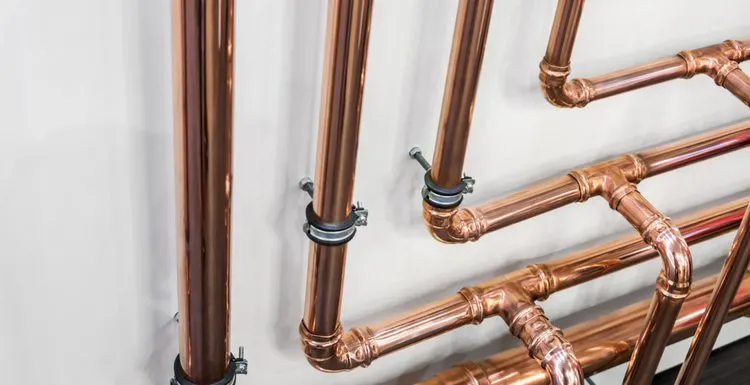If you’re wondering what to do about air in water lines, there’s good news: you can often troubleshoot the problem yourself and possibly avoid repair bills.
Read on to see what steps to take and things to consider.
We partnered with Networx to help you find local plumbers in your area. Click to below to get a FREE quote.
How Air Gets in Water Lines
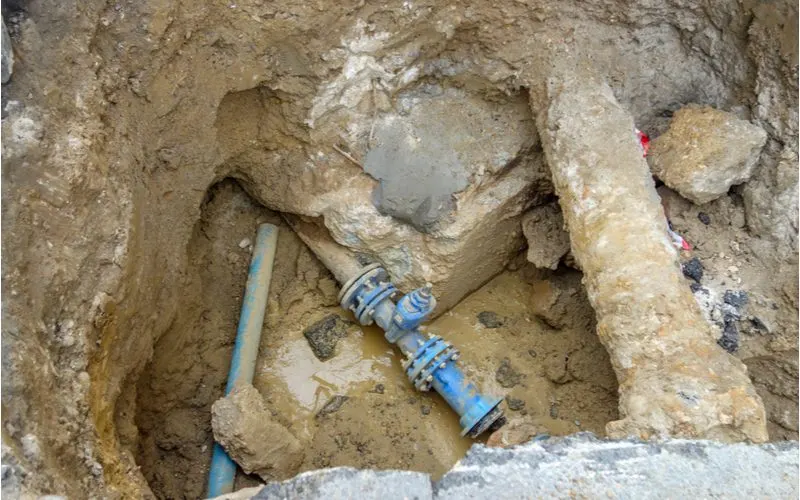
Nbnserge/Shutterstock
More often than not, air in water lines occurs after undergoing routine plumbing system maintenance.
If you hear the telltale hissing or popping from your faucet following routine repairs or upkeep, you can bet there’s likely air in the lines.
Weak water pressure is another common sign of air in water lines. The only difference in this instance is that it’s not a complete blockage. Still, sputtering faucets are hardly ideal.
Whether you had new pipes installed or your city shut the water off to work on the system, that period without water flowing in the pipes introduces air into the lines.
A little bit of air in water lines is nothing to worry about, but a significant amount of air can cause damage and inconvenience, so it’s definitely not something to ignore.
Fortunately, there are some simple steps you can take to try to fix the problem on your own before requiring the help of a professional.
Dealing With Air in Water Lines
As challenging as it can be to have air in your water lines, it’s often a relatively easy fix—just follow these steps, and you’re likely to find that you can solve the problem on your own.
Step 1: Shut Off the Water Main
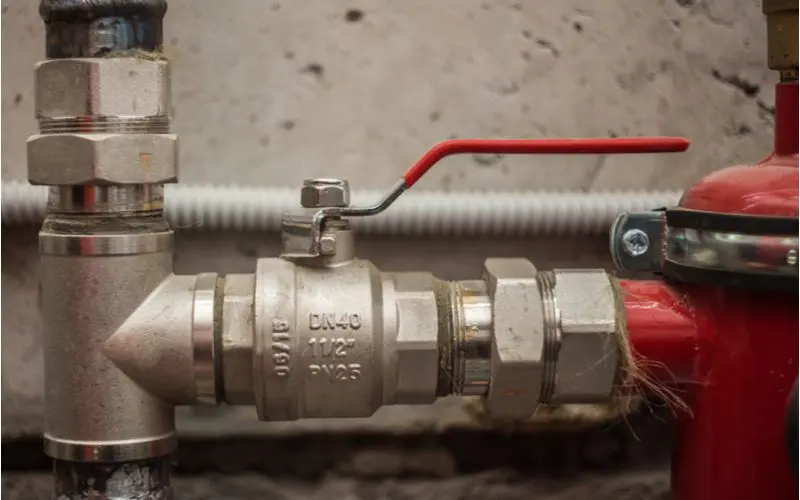
PV productions/Shutterstock
The first step in removing the air from water lines is to shut off the main water valve. It’s essential to know the location of the “main” for precisely these types of situations.
If you’re uncertain of the main water valve’s location, look outside; you’ll find the shut-off point wherever water enters the home.
An easy way to find your home’s main water location is to find your water meter; the valve should be nearby. If you’re still not sure where to start, simply walk the perimeter of your home. There are a couple of different types of valves you might see.
Older home styles have star-shaped valves such as those you’re used to seeing on garden hoses; newer homes have ball valves with levers.
In either case, you use the valve to turn off the water supply to your home, so you’re able to complete the rest of the troubleshooting steps safely.
When shutting off the main, remember the old adage: “Lefty loosey, righty tighty.”
Step 2: Give Air an Escape Route
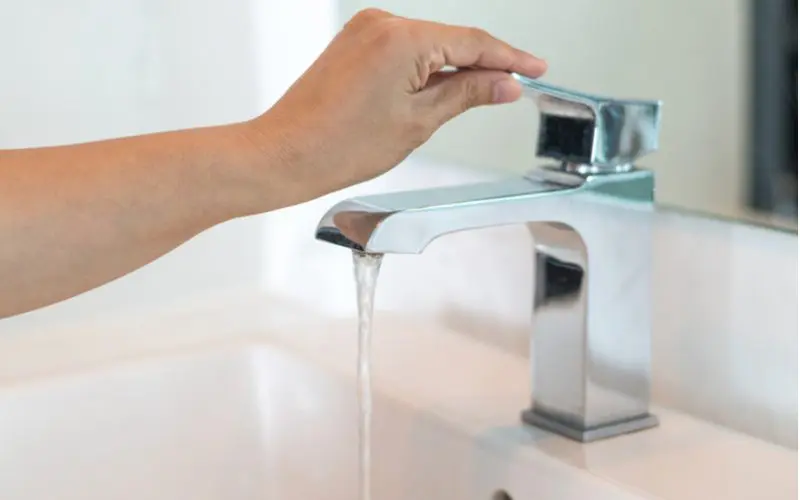
BlurryMe/Shutterstock
Once you turn off the water, make sure the air has a path out of the lines. To do this, open all of your faucets about half a turn. You should also turn on any other appliances that use water. Then, you should:
- Run your dishwasher
- Flush your toilets
- Turn on the water to any appliance or piece of equipment that uses water
When there’s air stuck in the water lines, it needs plenty of options to escape safely. After you complete this step, you’re ready to resupply your house with water and see whether your efforts were successful.
Step 3: Turn On the Water
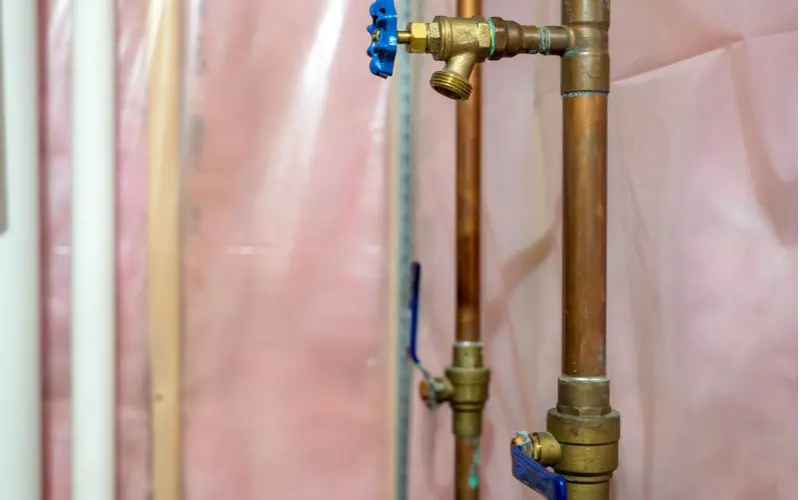
Lost_in_the_Midwest/Shutterstock
With the water lines throughout your home open, it’s time to re-supply the water by returning the water main to its original position. Once you do, the air should be forced out of the lines since you have provided so many avenues of escape.
Allow the water to run for at least 10 minutes. This extra time allows you to ensure you don’t hear anything abnormal and that everything is working as expected.
Once you’re satisfied that the air in your water lines is gone, you can turn off your faucets and get back to your daily routine without concern.
As long as the air in your water lines isn’t indicative of a more serious issue, these steps will usually do the trick and resolve the problem.
Things to Consider
While it might seem simple enough to fix air in water lines on your own, there are some important things to be aware of before taking on this project:
- The noise you hear could be a water hammer, not air in the water lines.
- An old water main might be calcified and difficult to open or close; don’t force it.
- Make sure your faucets are all open relatively equally; half a turn is a good rule of thumb.
- Remember to turn off all of the taps you opened once the air is out of your water lines.
- When in doubt, walk away and call a professional plumber for help.
Frequently Asked Questions
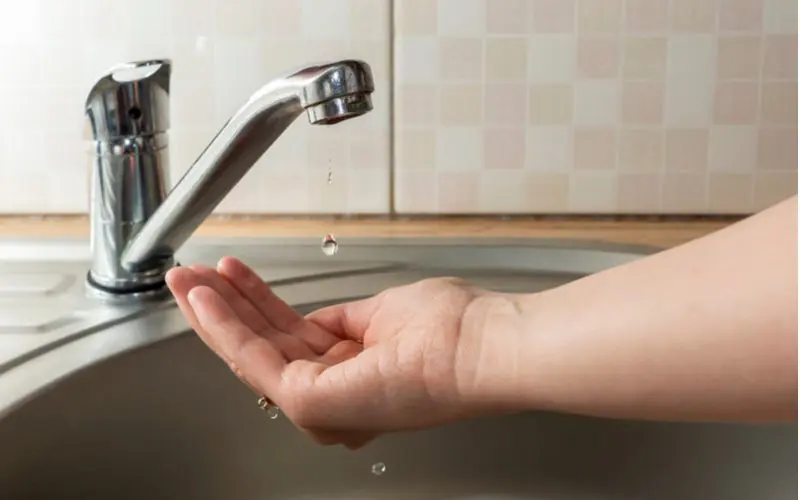
Sergei Gorin/Shutterstock
It’s only normal to have questions about air in water lines. After all, it’s not something many people deal with often. Here are some of the most common questions you might have.
Is It Bad to Have Air in Water Lines?
Air in your water pipes can potentially cause some damage if not fixed properly. You could even experience rusting and corrosion in some cases.
Not to mention that air in water lines means you have to live without adequate running water until the air is cleared out of the pipes.
In the meantime, your faucets and pipes will continue to sputter. In short, a little bit of air in your water lines probably won't bother you, but a lot of air in your water lines can lead to more significant issues.
What Does Air in Pipes Sound Like?
The most common noise associated with air in water lines is hissing or popping when turning on your faucets. Your pipes themselves might also be noisy, making ticking or vibrating sounds.
If you hear abnormal sounds coming from your walls, there's a chance air in your water lines is to blame, especially if you noticed some other signs, such as low water pressure.
Pay attention to any noises that occur when you turn a faucet off, too. If there's a lot of clunking or hammering, it could be a sign of a larger issue that requires immediate attention.
Will an Airlock Clear Itself?
The short answer is that an airlock will sometimes clear itself. However, it's risky and inconvenient to wait it out in hopes that the problem resolves independently.
Instead, the better option is to enlist the help of a professional when you feel unsure about how to proceed on your own.
When to Call a Pro

Monkey Business Images/Shutterstock
There are many reasons you might call a professional when trying to remove air from water lines; it’s crucial to get help from a trained plumber when you need it to avoid severe damage.
Old Valves
If you attempt to shut off the main water valve and find your home has an older, star-shaped valve that has calcified over time, making it difficult to move, don’t proceed with the project.
Instead, call a professional right away. You risk causing major headaches if you attempt to force the valve, and a plumber can replace it with a newer lever-style valve.
After replacing the valve, a pro can help you finish the job. This way, you can remove the air from your water lines without any guesswork involved in the process.
You Hear Hammering
Another instance where you ought to reach out to a professional is if you follow the steps outlined above but still hear a disconcerting ticking or vibrating in your pipes.
More specifically, if you hear a noise that you would classify as hammering when you turn off a faucet, there’s a good chance you have an issue with your water hammer, and you’ll need help from a pro.
Even if you hear a noise that you wouldn’t call hammering but still isn’t quite right, it’s time to accept that you need assistance from a professional.
Faucets Still Sputter
Finally, if you think you followed all of the troubleshooting steps closely and your faucets still run dry or merely sputter water intermittently when you turn your main water valve back on, call a professional to get some clarity about the issue.
Air in water lines is often a pretty simple fix. But it’s never wise to bite off more than you can chew when it comes to plumbing.
Even projects that seem simple can become major ordeals if handled improperly, so the best plan is to call a professional when you need help to avoid excess damage in the long run.
We partnered with Networx to help you find local plumbers in your area. Click to below to get a FREE quote.
Still Have Air in Water Lines?
If you hear the dreaded hissing and popping when you turn on your faucet (or an annoying ticking in your pipes), don’t worry — you’ll probably be able to solve the problem by taking the steps above.
Remember, though, that air in water lines can cause damage to your plumbing system, so it’s always better to call in the help of a professional if you feel out of your depth.

